

The End of Borders and the Future of Books.
Authors. Famous for the wrong book. Literally – the much misused word of the moment. I was sitting in a cafe – one of those generic pain au raisin and latte joints, with an earnest singer-songwriter soundtrack to boot – when a kid to my left piped up: "My school gym is like literally 500 years old.
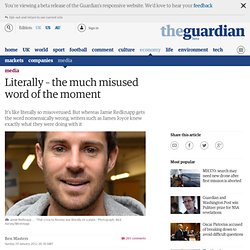
" His friends nodded with conviction. UT College of Liberal Arts. [1] Apr 4, 2014 The Men Who Ruled Palestine Bernard Wasserstein Seven men ruled Palestine as High Commissioner under the British mandate between 1920 and 1948.
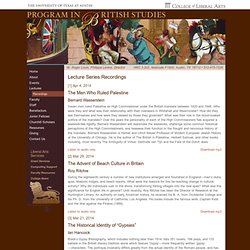
Who were they and what was their relationship with their overseers in Whitehall and Westminster? How did they see themselves and how were they viewed by those they governed? Listen to audio onlyDownload mp3 [2] Mar 28, 2014. Steven Pinker on the false fronts in the language wars. Nature or nurture.
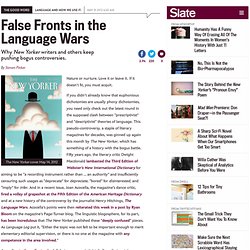
Love it or leave it. If it doesn’t fit, you must acquit. The Most Comma Mistakes. Draft is a series about the art and craft of writing.
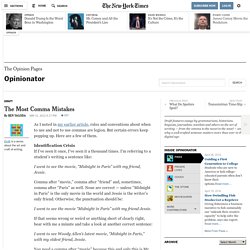
As I noted in my earlier article, rules and conventions about when to use and not to use commas are legion. But certain errors keep popping up. Here are a few of them. Semicolons: A Love Story. Word for Word. Reconsiderations Thesaurus of English Words and Phrases by Peter Mark Roget.
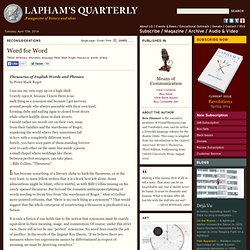
You're Reading the Wrong Vonnegut: Or, why authors' best known books are often not their best books. Posted by Patrick on July 20, 2011 Yesterday, in the Guardian, John Self wrote a very entertaining post about why it seems that so many authors' best known works are not their best works.
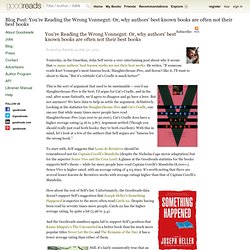
He writes, "If someone reads Kurt Vonnegut's most famous book, Slaughterhouse-Five, and doesn't like it, I'll want to shout to them, "But it's rubbish! Cat's Cradle is much better! " We Can't Teach Students to Love Reading - The Chronicle Review. By Alan Jacobs While virtually anyone who wants to do so can train his or her brain to the habits of long-form reading, in any given culture, few people will want to.
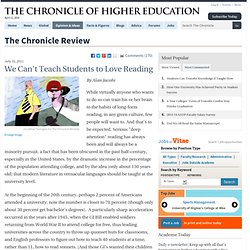
And that's to be expected. Serious "deep attention" reading has always been and will always be a minority pursuit, a fact that has been obscured in the past half-century, especially in the United States, by the dramatic increase in the percentage of the population attending college, and by the idea (only about 150 years old) that modern literature in vernacular languages should be taught at the university level. At the beginning of the 20th century, perhaps 2 percent of Americans attended a university; now the number is closer to 70 percent (though only about 30 percent get bachelor's degrees). Doubling in the Middle.
Discussed: Epic Struggles, The Distance Between Masters and Hacks,Palindromic Taxonomy, A Convenient Ampersand, Cutting-Edge Work in Reversibility, Some Limitations of an Untrained Audience, A Strange Kind of Amazing, The Relationship Killer, Disproportionate Responses, A Surfeit of Calendars, A Deficit of Wool and Illusions.
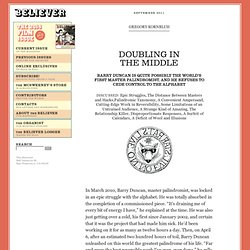
John Sutherland on <i>The World of Others: From Quotations to Culture</i> John Sutherland The Words of Others: From Quotations to Culture By Gary Saul Morson (Yale University Press 352pp £20) Academics like me are skilled users of turnitin.com.
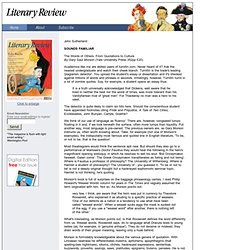
Susan Sontag: Notes On "Camp" Published in 1964.
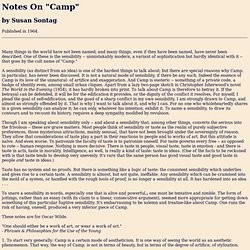
The Pleasures and Perils of Rereading. In his often anthologized essay “On Reading Old Books,” William Hazlitt wrote, “I hate to read new books. There are twenty or thirty volumes that I have read over and over again, and these are the only ones that I have any desire to ever read at all.” This is a rather extreme position on rereading, but he is not alone. Larry McMurtry made a similar point: “If I once read for adventure, I now read for security. How nice to be able to return to what won’t change. When I sit down at dinner with a given book, I want to know what I’m going to find.” Spacks herself feels slightly differently. Yet there are far more positive spins put on rereading in Spacks’s book and elsewhere. The Top 10 Books Lost to Time. Modern Era Brings Death To Words. Why Finish Books? by Tim Parks. Will paper books exist in the future? Yes, but they’ll look different. Book designed by Sara De Bondt Studio/Visual Editions.
The change has come more slowly to books than it came to music or to business correspondence, but by now it feels inevitable. The digital era is upon us. The Twilights and Freedoms of 2025 will be consumed primarily as e-books. In many ways, this is good news. Books will become cheaper and more easily accessible. In the past several years, we’ve all heard readers mourn the passing of the printed word. Broken English. A new kind of novel is taking over. Is the “hindered narrator” a step forward for fiction? The story of Jonathan Safran Foer’s novel Extremely Loud and Incredibly Close is told by a precocious grieving boy—in other words, a classic hindered narrator.
Credit: promotional and production. Henry Hitchings on Proper English. If music can be art, why cant food? Peter Phillips Reviews "The Christian West And Its Singers: The First Thousand Years" What Amazon's ebook strategy means. It seems to me that a lot of folks in the previous discussion don't really understand quite what makes Amazon so interesting—and threatening, for that matter—to the publishing industry. The Amazon Effect. From the start, Jeff Bezos wanted to “get big fast.”
Independent bookstores vs. Amazon: Buying books online is better for authors, better for the economy, and better for you. Independent bookstores are not doomed. Here’s how they can fight back against Amazon. Photograph by Paul J. Richards/AFP/Getty Images. Johann Hari: How to survive the age of distraction - Johann Hari, Commentators. How Google Dominates Us by James Gleick. In the Plex: How Google Thinks, Works, and Shapes Our Lives. Secularism and Its Discontents. Olivier Roy, a professor of social and political theory at the European University Institute, in Fiesole, Italy, has the exceptional ability to bring religion, globalization, and politics to his discussions of political Islam and its role in European and Islamic societies.
O Sister, What Art Thou: Kathryn Lofton on the Religion of Oprah. What Ever Happened to the New Atheism? ‘Public Parts’ and its public parts: In a networked world, can a book go viral? Great Gatsby: a story for the modern age. Is That a Fish in Your Ear? — Translation and the Meaning of Everything — By David Bellos — Book Review. Native Tongues. David Bell: What We’ve Lost With The Demise Of Print Encyclopedias. Librarian, Distressed. The North West London Blues by Zadie Smith. What’s the big idea? On Not Going Out of the House: Thoughts About Plotlessness. On Treating Books Badly. The Swerve - How the World Became Modern - By Stephen Greenblatt - Book Review. The books business: Great digital expectations. The Late Word by Curtis White. The Mechanic Muse - The Jargon of the Novel, Computed. Harvard Magazine Sep-Oct 2011. The Little Room of Danger and Depth. The Pleasures of the Audiobook. Private Eye: The First 50 Years by Adam Macqueen - review.
Theodore Ziolkowski on Gilgamesh. Ti Point Tork » Blog Archive » Libraries: Where It All Went Wrong. Murder your darlings. Cutting their own throats. Joanne Harris: Criticism is fine, but do you have to spoil the plot? - Commentators - Opinion. An Essay by Julian Gough. Do We Need Stories? by Tim Parks. Marjorie Perloff: Poetry on the Brink. What Do Spoilers Spoil? Why fiction is good for you. The Optimistic Directive. Reading Lists. The Game’s Afoot: The Case of the Mystery Genre’s Terrible Secret. Should Writers Reply to Reviewers? - The Chronicle Review.